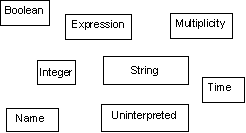Data Types
The heading 'data types' groups all the abstractions underlying UML. They are not model elements, and therefore they do not have stereotypes, tagged values, or constraints. A primitive type is a data type that has no substructure.
Simplified metamodel representation of some UML data types.

The following is a list of UML data types:
-
Boolean. A Boolean is an enumerated type with the two values
True
and False
.
-
Expression. An expression is a character string whose syntax goes beyond the scope of UML.
-
Multiplicity. A multiplicity is a non-null set of positive integers extended by the character
*
to indicate an unlimited multiplicity. The multiplicity is specified by a comma-separated sequence of integer intervals. For example, intervals of the form 0..1
and 1..10
indicate multiplicities of 0 to 1 and 1 to 10 respectively.
-
Name. A name is character string that enables the specification of an element. Composite names take the form,
-
simple_name{'.'composite_name}
-
and may be qualified by the name of its containing or referencing package:
-
package_name{'::'simple_name}
-
Integer An integer is a primitive type, which is an element of the infinite set of positive and negative whole numbers.
-
String. A string is a primitive type. It is a sequence of characters referred to by a name.
-
Time. A time is a character string that represents an absolute or a relative duration, whose syntax goes beyond the scope of UML.
-
Uninterpreted. An uninterpreted type is a 'thing' whose meaning depends on the domain, and which is undefined in UML.
© 1997 Editions, Eyrolles, Paris, France . All rights reserved.

